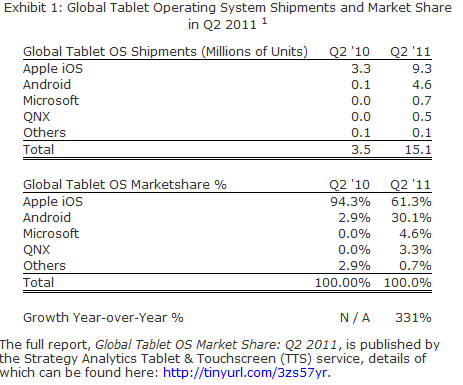Report: Microsoft worldwide tablet operating-system share at 5 percent

I hear from quite a few readers that they think Windows 7 tablets are the cat's meow. But it looks like more people than not agree with me that those tablets are just not what the majority find palatable.
According to numbers released on June 21 by Boston-based research firm Strategy Analytics, global tablet shipments reached 15 million units in the second quarter of 2011. Apple maintained first position with 61 percent share -- down substantially from 94 percent a year earlier. Tablets running Android, meanwhile, zoomed to 30 percent operating system share from 3 percent in the year-ago second quarter.
What about Microsoft, which has a number of partners selling Windows 7-based tablets, aimed primarily at the business market? Windows 7 tablet share grew from zero percent in Q2 2010, to 4.6 percent in Q2 2011, Strategy Analytics said. Windows 7 tablets were slightly more popular than the RIM Playbook running QNX, which also grew from zero percent share in Q2 last year, to 3.3 percent this year.
Here are Strategy Analytics' qualifiers for these numbers: "Shipments refer to sell-in. Numbers are rounded. The definition of tablet does not include e-book readers." (I believe this means these are shipments to the channel, not end users. If I hear otherwise, I'll update.)
Microsoft's "real" iPad competitor is going to be Windows 8, which isn't expected to come to market until mid-2012, at best. But that isn't stopping a number of Microsoft OEMs from continuing to release Windows 7 tablets in the interim. Microsoft has backed away from touting slates running the Windows Embedded Compact operating system as potential iPad competitors.
Microsoft has encouraged its partners selling Windows 7 tablets against the iPad to emphasize Windows 7 tablets' security, compliance abilities, enterprise-networking and line-of-business application compatibility.
Microsoft officials are adamant that tablets are basically PCs -- a positioning statement with which I (and a number of other Microsoft watchers, customers and partners) don't agree. Because of this position, Microsoft is preventing its OEMs from putting the Windows Phone OS on tablets, and is licensing to tablet makers the full Windows operating system instead.
See also:
